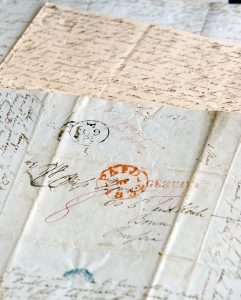Senior Lyell Archivist, Elaine MacGillivray, reviews her first month in post and shares some of the exciting work and plans afoot for the internationally significant Sir Charles Lyell archive.
The Sir Charles Lyell archive is of international importance and attracts great interest from academics and researchers from around the world. A key aim of our Lyell project is to make the archive as openly accessible as possible. To achieve this aim, we are progressing a number of areas of project work.

The Charles Lyell Notebooks, 1825-1874
(Ref: Coll-203/A1)
Our project archivist, Elise Ramsay’s cataloguing work continues apace and Elise is aiming to complete the cataloguing of Lyell’s 294 notebooks by the end of July 2021. Between January and March 2021, Elise also undertook a pilot project to transcribe a sample of Lyell’s notebooks using ground-breaking transcription technology, Transkribus. Elise and I were delighted to showcase the Lyell archive, our project plans, and to share our learning from the pilot with 150 international delegates at the EDITOR Transcription Workshop held earlier in March 2021. (More on that exciting development in a future blog post).
While Elise has been diligently cataloguing, I have been busy mapping all of the Lyell archive. We now have a really useful and comprehensive overview of the location, extent, scope and content of the four main elements of the collection, which feeds into our newly devised cataloguing work plans.
On completion of the first phase of cataloguing, the subsequent focus will be Lyell’s vast working correspondence and notes allocated to the University of Edinburgh in Lieu of Inheritance Tax in 2020. We have already migrated some of the existing descriptive data for this series to an electronic data-set which we can use to undertake a stock-take. This work will allow us to enhance the existing item level descriptions which we will then import into our online archives catalogue ArchivesSpace. With almost 1200 letters and a further 54 folders of papers including lecture notes and field-work we expect this work to keep us busy for some time!

Letters from Sir Charles Lyell from the Sir Charles Lyell archive.
Photo © David Cheskin
(Ref: Coll-203/Uncat)
Lyell’s correspondence includes letters between Lyell family members from as early as 1806 (when Charles Lyell was only 9 years old), as well as over 640 letters received by Charles Lyell between 1829 and 1874. 65 of those letters are from botanist, explorer and close friend of the naturalist Charles Darwin, Sir Joseph Dalton Hooker (1817-1911). They cover almost 40 years (1846-1874) during which time, Hooker was appointed botanist to the Geological Survey of Great Britain, undertook expeditions to India, the Himalayas, Syria, Palestine, and Morocco, and was latterly appointed Director of the Royal Botanic Gardens at Kew. We can’t wait to discover how these letters further illuminate the relationships and ideas shared between Lyell, Darwin and Hooker. We will be sure to share our findings with you here – watch this space.
Thanks to generous funding from the National Manuscripts Conservation Trust, supplemented by philanthropic donations we are delighted that a comprehensive conservation and preservation project will commence, we hope, later in the summer of 2021 (global pandemic permitting). I have been working closely with our Special Collections conservator to pull together a work-plan for our incoming project conservator. The conservation project will see all of the Lyell archive cleaned, repaired, consolidated, stabilised, rehoused and the conservation work fully documented. This work will serve to stabilise the collection, preventing the exacerbation and risk of further deterioration. Expect more updates on this work later this year.
Other work for me has centred around developing our project plans for the next three years: looking at how we can best enable collections access and bring to light the fascinating stories, ideas and knowledge from within the Lyell collections, to support learning, teaching and research. With this in mind, we quietly launched our public engagement account on Twitter on 8 March 2021. We were somewhat overwhelmed by the warm welcome we received and are delighted to have amassed 184 friendly followers already. You can follow us @LyellTime for more regular project highlights and chat from the project team as we work to preserve, catalogue, digitise and engage with the Sir Charles Lyell archive.
As well as plans for the development of our online resource ‘Charles Lyell’s World Online’ (thanks to generous funding from the International Association of Sedimentologists), we have a high profile, impactful and collaborative exhibition and engagement programme in our sights for the second half of 2023.
Our plans also include a significant programme of collections digitisation. We have completed a trial of photographing at high resolution 12 of Lyell’s notebooks. This means that you can now view over 1500 pages from these 12 notebooks via the University of Edinburgh Image Collections website. These images are CC-BY licensed supporting the University of Edinburgh’s open education activities and initiatives. You can find more information on CC-BY licensing on the Centre for Research Collections Image Licensing website pages.
Digitisation helps us to protect and preserve this unique archive collection whilst simultaneously enabling and enhancing access. Completing the digitisation programme means that digital images of the Lyell collections will be openly accessible online. Digitised content is also critical to our plans to generate transcriptions of the Lyell collections using Transkribus. Our ambition is to build on our existing transcription pilot to build a significant body of transcribed material, making the collections more broadly accessible to all levels of scholar.
We hope you have enjoyed reading about our news from the last month. Please share your thoughts in the comments. Next month, Elise and our project volunteer Erin McRae, will be bringing you an update on our pilot transcription project – stay tuned!
Elaine MacGillivray
Senior Lyell Archivist
